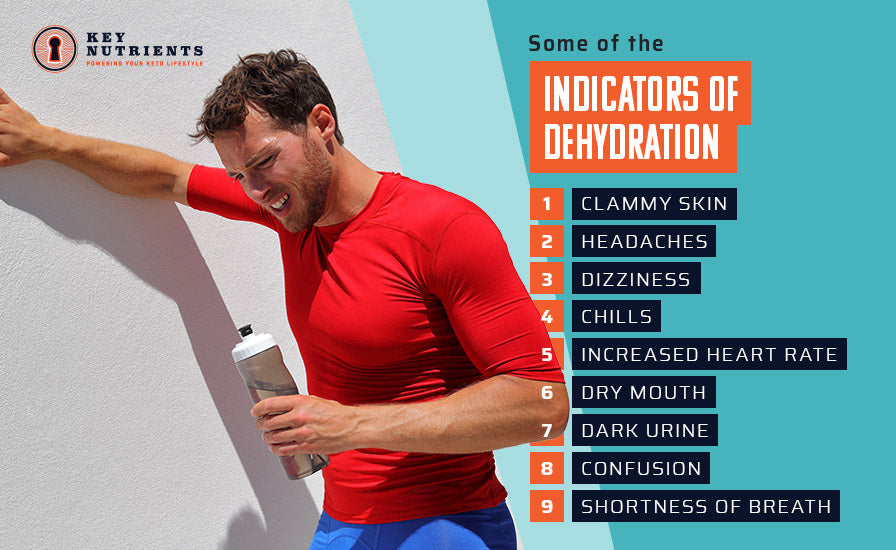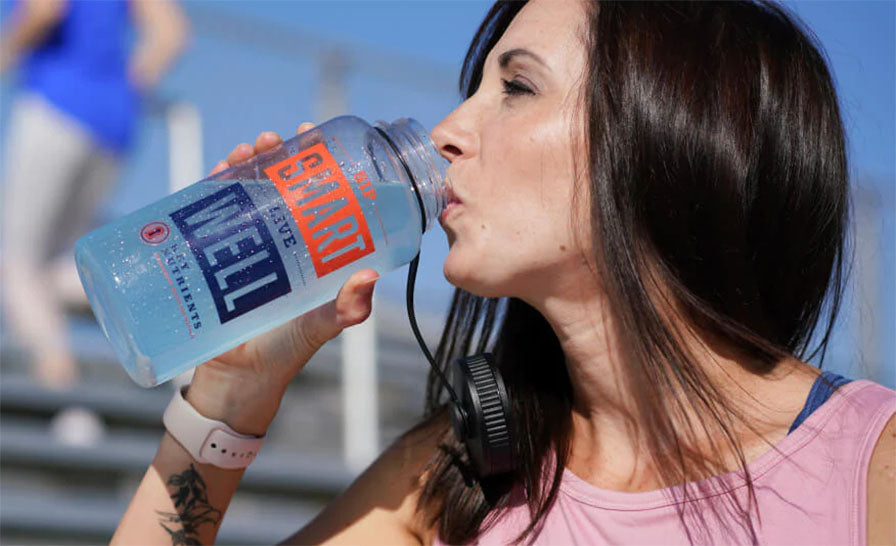
Exercise Tips: Importance of Hydration During Exercise
Share

No matter if you are an elite athlete or just someone who is conscious of their health and well-being, the importance of hydration during exercise remains the same.
Water helps to regulate your body’s temperature and lubricate the joints, thus allowing you to maximize your sessions. At the same time, fluids also help to transport vital nutrients throughout the body, thereby providing energy, helping in workout recovery and allowing you to remain healthy overall.
If you are not properly hydrated, it is impossible for you to reach peak performance. Worse yet, a state of dehydration can result in adverse health effects.
If you want to know more about the importance of hydration during exercise, how much water you should be drinking and various other hydration tips, you’ve come to the right place.
Here is what you need to know about the interplay between exercise and hydration.
The Importance of Hydration During Exercise
Fluids are critical for maintaining a healthy body, including your muscles, heart, brain and other vital organs and for regulating your bodily temperature via perspiration. In addition to maintaining health and physical performance, proper hydration also helps to improve sleep and assists in weight loss.
Check Out a Variety of Electrolyte FlavorsOn the other hand, dehydration can lead to a multitude of problems such as muscle fatigue, excessive sweating, overheating and tons of other adverse effects.
Side Effects of Dehydration
There are various issues caused by dehydration. First, on the physical side of things, losing a mere one to two percent of your body mass in sweat can result in a significant decrease in athletic performance, affecting strength, speed, stamina and more. If the loss is greater than two percent, it can result in more serious side effects such as nausea, vomiting, diarrhea and other such issues.
On the mental side of the equation, dehydration can quickly cause a person to lose focus, feel dizzy and possibly even faint, which also puts a person at risk for physical harm.
Avoiding these kinds of physical and mental maladies means it is not only vital for a person to hydrate with water, electrolyte pills loaded with essential minerals and vitamins and other hydration tools, but it is also critical for a person to be able to detect the signs of dehydration in themselves and others.
Indicators of Dehydration
While many people believe thirst to be the best indicator that they are in need of fluids, this is a misconception, as thirst is actually a sign that you are already mildly dehydrated.
However, this is far from the only indicator of dehydration. Others include:

- Clammy skin
- Headaches
- Dizziness
- Chills
- Increased heart rate
- Dry mouth
- Dark urine
- Confusion
- Shortness of breath
If any of these symptoms surface, it is essential to get water into your system, preferably using methods that will help you rehydrate quickly.
If fluids are not introduced into the body, dehydration can often lead to additional issues, such as cramping, fatigue, heat exhaustion, heat stroke and more.
Why Dehydration Occurs During Exercise
When a person exercises, they sweat as the body attempts to regulate its temperature and return to its typical state. As that sweat evaporates from the surface of the skin, the body is cooled. However, that fluid is lost and needs to be replaced.
This means that the importance of hydration during exercise cannot be overstated. By maintaining your hydration while working out, you are helping to mitigate the potential for heat stress, maintaining normal bodily functions and pushing performance levels higher.
Additionally, do be aware it is possible to drink too many fluids. Symptoms of overhydration include headaches, nausea, vomiting, confusion and, in extreme cases, it could even cause death. However, generally speaking, overhydrating while exercising is rare and is usually not something you will need to worry about, assuming that you are sweating normally and consuming reasonable amounts of water.
When it comes to understanding how much water you should be drinking during your exercise routine, it is useful to understand how to calculate your sweat rate, as this will inform you about how much fluid you need to replace. Alternatively, you can also opt to speak about the matter to your general practitioner or a sports dietician. However, understanding your sweat rate and speaking to a professional are generally only needed for professional athletes.
There are some general hydration guidelines the average person can follow to keep themselves in a safe state of hydration while exercising.

How Much Water to Drink While Exercising
There are no hard and fast rules for how much water to drink while exercising. This is because there are variables to account for, including age, height, weight, sex, workout intensity, environment and others. Yet, the importance of hydration during exercise remains.
Therefore, the best a person can do (if they don’t work out their exact sweat rate or speak to a professional) is follow general guidelines, which will vary based on your particular circumstances.
Thus, the guidelines laid out by the American Council on Exercise should be enough and be tweaked to fit each individual person. Those guidelines include:
- Drink seven to 10 ounces of fluid every 10 to 20 minutes during exercise.
- Drink 16 to 24 ounces of fluid for every pound of body weight lost after exercise.
Again, athletes will likely want to obtain a more precise number to optimize their performance output. However, these figures should do fine for the average person.
Best Beverage for Rehydrating During Exercise
When many folks think about hydration, they think about sports drinks and other beverages that have been cleverly marketed and associated with vigorous activity. This is, in part, because these kinds of beverages contain electrolytes, which are essential for hydration and overall health.
However, these beverages are not ideal in any situation and are not the best drinks to replace electrolytes. These kinds of commercial beverages are loaded with sugars and additives that not only can act as diuretics but are generally antithetical to improving one’s health.
For most folks, water will do just fine to keep you hydrated during a workout. However, if you are engaged in a high-intensity exercise for longer than an hour, you will indeed need to replenish electrolytes during the session. Instead of grabbing a sports drink, opt to infuse your water with a sugar-free electrolyte powder that contains all the essential minerals and vitamins you need to re-energize and rehydrate during your workout.

In addition to sugar-filled sports drinks, some other beverages that you will want to avoid include:
- Carbonated beverages like soft drinks
- Sugary juices
- Caffeinated beverages
Remember to Hydrate Before and After Exercising
While the importance of hydration during exercise cannot be overstated, it is vital to remember that maintaining your hydration levels prior to and after your workout session is just as important. On top of being critical to your health, proper hydration is essential for reaching peak performance levels.
While it is not the most scientific or accurate measure of hydration, one way to tell if you are in need of fluids is by checking the color of your urine. If it is light yellow like straw, you are in a good spot. However, if it is dark yellow, has hues of amber and smells strong, you are certainly in need of more water. This is one simple way to check your hydration levels before and after a workout.
As far as how much water you should drink before and after goes, this again will vary depending on a multitude of factors, including:
- Sex
- Age
- Weight
- Height
- Environment
- Current level of hydration
- Workout intensity
However, turning back to the general guidelines proposed by the American Council on Exercise, you should consume at least 17 to 20 ounces of water two hours prior to your session, and then another 16 to 24 ounces for each pound of body weight lost after exercise. This figure can easily be found by simply stepping on a scale before and after a workout.
Check Out a Variety of Electrolyte FlavorsOnce again, the exact amount of water that you consume before or after you work out might be more or less than the above guidelines, as your personal characteristics and circumstances will influence your level of consumption.
Moreover, it is best to rehydrate soon after your exercise and get some electrolytes at the same time. But, again, be sure to avoid sugar-laced beverages, even if they contain the vitamins and minerals you seek.

Additional Tips for Staying Well Hydrated
We have gone into quite a bit of depth on the importance of hydration during exercise. However, it is critical for your health to remain hydrated at all times. This is because dehydration can lead to many undesirable and dangerous complications, including diarrhea, vomiting, fever, seizures, kidney failure, shock, coma and, in extreme cases, death.
Thus, you must always watch your body’s fluid levels to ensure your health and safety. Some addition tips for staying well hydrated at all times include:
- Drink a glass of water first thing in the morning to replenish fluids lost during sleep.
- Carry a water bottle with you while on the go.
- Develop a hydration strategy for your daily routine and exercise sessions.
- Calculate your sweat rate.
- Integrate foods that are high in water content and electrolytes into your daily diet.
- Continue to drink lots of water in the two-to-six-hour window following a workout, as you will continue to lose fluids via sweating and urination.
These are just a few of the many ways you can stay on top of your hydration levels. There are scores of other ways that you can ensure that you are taking in the proper amount of fluids all throughout the day.
Be sure to integrate these and other hydration strategies into your overall daily routine and certainly into your exercise regimen.

Staying Well Hydrated While Working Out
The importance of hydration while working out cannot be overstated. Not only does consuming the right amount of fluids allow you to lubricate your joints and regulate your body temperature, but it ensures bodily functions continue to operate smoothly.
This rundown on the importance of hydration while working out should give you a solid foundation on the topic overall, explain to you why fluids are critical to your exercise routine and tell you how to maintain a healthy level of hydration at all points in the day.
However, do remember that hydration doesn’t come down to water alone, as electrolytes are critical as well. Therefore, if you are in the market for a quality keto electrolyte powder, shop Key Nutrients’ line of rehydration supplements for the ideal solution for your needs.
Image Credits
gpointstudio/Shutterstock.com
Cookie Studio/Shutterstock.com
Maridav/Shutterstock.com
